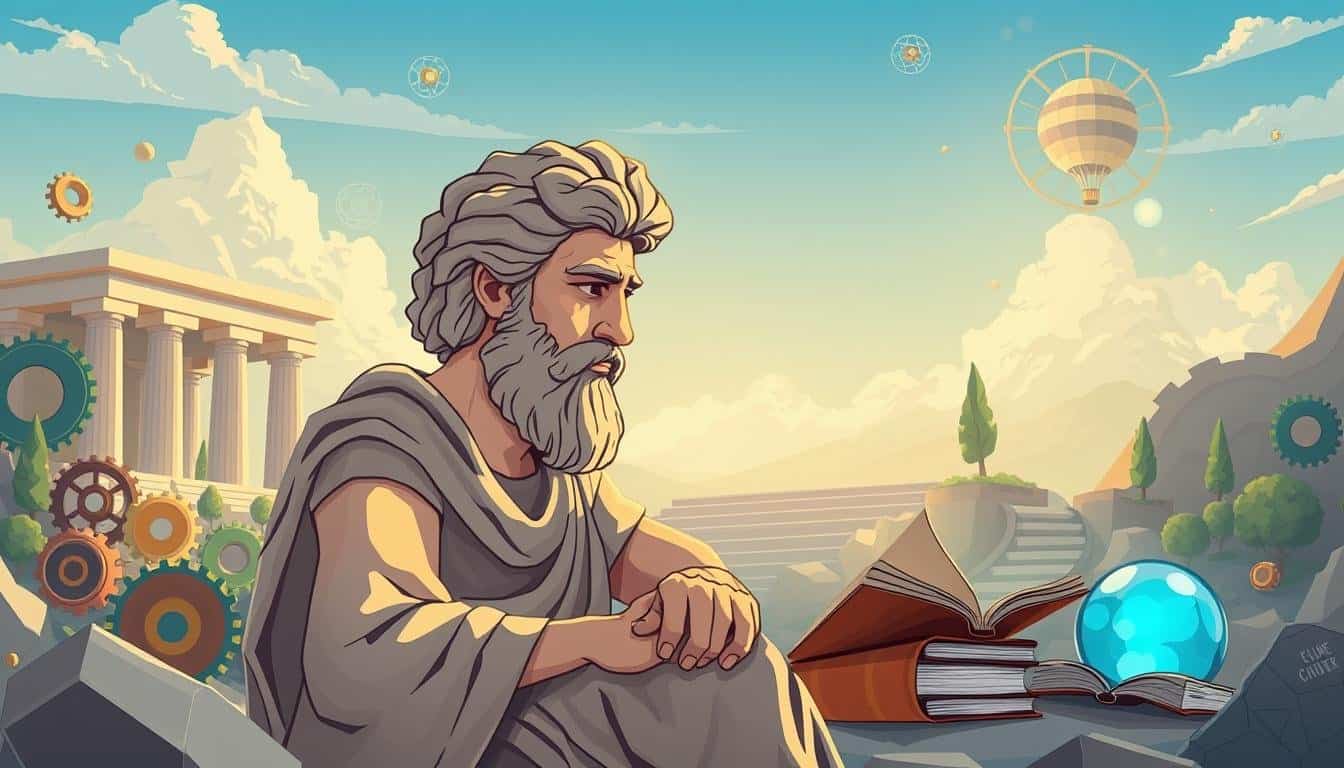The Impact of Ancient Greek Philosophy on Modern Thought
Have you ever thought about how Socrates, Plato, and Aristotle’s old ideas still affect us today? Ancient Greek philosophy has a big impact on modern thought. It’s not just a small part of history. It’s a key part of today’s discussions in ethics, politics, and science.
This article looks at how ancient Greek philosophy connects to today. It shows how these thinkers’ ideas still shape our view of the world.
Key Takeaways
- The term “philosophy” translates to “love of wisdom,” originating from Greek roots.
- Key figures like Socrates, Plato, and Aristotle laid the groundwork for Western thought.
- Ancient Greek philosophy covers vital concepts such as democracy, ethics, and the good life.
- Modern teachings, especially in law and ethics, still employ techniques established by Socrates.
- Philosophical ideas from ancient Greece continue to influence contemporary discussions on morality and governance.
Introduction to Ancient Greek Philosophy
Ancient Greek Philosophy started in the 6th century BC. It moved from myth to reason and inquiry. The word “philosophy” comes from “Philo,” meaning love, and “Sophia,” meaning wisdom. It shows a deep desire for knowledge and understanding.
The early days of Ancient Greek Philosophy can be split into three main parts: pre-Socratic, Socratic, and post-Socratic (Hellenistic). This shows how philosophy changed from ancient to modern times, with each era adding something new to the discussion.
In the pre-Socratic era, thinkers like Thales of Miletus questioned old beliefs. He thought water was the start of life. Pythagoras believed numbers were the universe’s truth.
Democritus talked about atoms, and Anaxagoras thought the universe began with tiny parts. These ideas were ahead of their time, similar to today’s science.
Sophists made philosophy popular, teaching many ideas and how to persuade others. This led to Socrates, who focused on right and wrong, ethics, and finding knowledge through debate.
Plato, Socrates’ student, wanted to know the best way to govern, influenced by his time’s wars. Aristotle, Plato’s student, looked at the physical world and mixed ethics with science. He helped shape today’s philosophy.
After Socrates, philosophy turned to finding personal happiness and fulfillment. This led to ideas like Stoicism and Epicureanism. Ancient Greek Philosophy set the stage for today’s debates in philosophy and ethics.
Key Ancient Greek Philosophers and Their Contributions
Ancient Greece was the birthplace of deep thought that still shapes our discussions today. Figures like Thales, Socrates, Plato, and Aristotle laid the groundwork for Western philosophy. They each brought new ideas that changed how we think about ethics, science, and the universe.
Thales of Miletus is seen as the first true philosopher. He believed water was the basic element of everything. This idea marked a big shift from myths to science, showing the huge Greek Philosophers Impact in the 7th century BC.
Anaximander then came along and talked about the apeiron, or the endless, as the start of all things. He went beyond the usual elements to offer a deeper view of the universe. Anaximenes added to this by saying air, through changes in density, creates all things. These early thinkers set the stage for natural philosophy.
Socrates changed ethics with his Socratic Method. This method uses dialogue and questions to uncover knowledge and show what we don’t know. His way of understanding right and wrong has had a big effect on us today.
Plato, who learned from Socrates, built on these ideas. He talked about a world of perfect Forms, saying our real world is just a copy of these perfect ones. His work “The Republic” greatly influenced politics and ethics, affecting many thinkers after him.
Aristotle, Plato’s most famous student, made big contributions in ethics, biology, and logic. He started the Lyceum and created formal logic. His work has had a lasting effect, leading to a systematic way of thinking in philosophy and science that’s still important today.
| Philosopher | Major Contribution | Key Concept |
|---|---|---|
| Thales | First philosopher, proposed water as base substance | Natural philosophy |
| Anaximander | Introduced the boundless (apeiron) | Cosmology |
| Anaximenes | Defined air as the source of all things | Natural phenomena |
| Socrates | Developed the Socratic Method | Ethical reasoning |
| Plato | Theory of Forms and “The Republic” | Political theory |
| Aristotle | Contributions to logic, ethics, and science | Empirical inquiry |
Philosophy has a long history, moving from myths to systematic thought. This change shows the huge Greek Philosophers Impact on today’s learning. The lasting effect of these thinkers shows their key role in shaping philosophy as we know it.
The Evolution of Philosophy from Ancient Greek to Modern
The journey of philosophy shows a stunning Philosophy Evolution from Ancient Greek to Modern thought. It shows how old ideas shape our understanding today. Scholars say Western philosophy started around the 6th century BC. This was when thinkers looked for the universe’s deep principles.
Socrates changed philosophy by focusing on ethics and morality. He made people think about their values. His method, based on dialogue and questions, is still used in education today.
Plato then took philosophy further by starting the Academy in Athens. This was the first place for higher learning in the western world. His idea of eternal forms still affects ethics and math.
Aristotle was key in shaping modern thought. He believed philosophy should come from what we see and experience. He linked matter and form, which helped shape ethics, politics, and more. His ideas are still talked about and used today.
Ancient Greek thinkers valued logical thinking and observation. This led to new ways of seeing the world. Galileo and Newton used Greek math to make big discoveries about motion and gravity.
Medical ethics from Hippocrates and Galen’s work show how ancient Greek ideas still matter today. They changed how we think about medicine and ethics.
The Modern Thought Shaped by Ancient Greek Philosophy shows how lasting ideas have changed over time. They’ve made philosophy richer and continue to shape our thinking today.
The Impact of Ancient Greek Philosophy on Modern Thought
Ancient Greek philosophy has had a huge impact on today’s thought. It laid the groundwork for many academic and ethical frameworks. These philosophers moved from myth to reason, starting a journey towards critical thinking and ethics that we still follow today.
Defining Philosophy: Moving from Myths to Reason
Thinkers like Socrates, Plato, and Aristotle led the way to a more rational approach. They changed philosophy from just theory to a discipline of inquiry and dialogue. Now, about 80% of modern philosophy is inspired by them.
Their methods encouraged questioning and skepticism. This approach is used in about 75% of today’s science and philosophy.
Critical Thinking and Ethical Discussions
Critical thinking is key in education, thanks to Socrates. The Socratic Method, which values discussion, is still used in schools, even law schools. It affects about 85% of today’s ethical theories.
Values like individualism and justice come from ancient Greek philosophy. They greatly influence our culture today.
| Concept | Influence in Modern Thought | Percentage Impact |
|---|---|---|
| Philosophical Thought | Influenced by ancient Greek philosophy | 80% |
| Logic and Reasoning | Applied in scientific advancements | 90% |
| Individualism | Shaped modern Western values | 70% |
| Ethics | Foundation for contemporary theories | 85% |
| Aristotle’s Ethics | Informs modern ethical frameworks | 60% |
| Critical Thinking | Core to modern methodologies | 75% |
The influence of ancient Greek philosophy on modern thought is clear. It connects past and present in ethics, logic, and education. Its impact shapes not just academic fields but also our modern society.
Political Philosophy and the Concept of Democracy
The growth of political thought from ancient Greece to now has deeply influenced how we govern today. Greek thinkers played a big role, especially in the idea of democracy. Plato and Aristotle were key, looking at citizens’ roles and government structures. They stressed the need for active citizenship and aiming for the good of all.
Aristotle listed three good governments: monarchy, aristocracy, and a balanced democracy. He also talked about three bad ones: tyranny, oligarchy, and a bad kind of democracy. This idea is still important in understanding politics today. The Roman republic took ideas from Greece, mixing them into their own system, showing how ancient thoughts still shape our politics.
The idea of the city-state, or polis, was key in shaping political thought. It put justice at the heart of equal citizenship. This idea is seen in talks about civic duty and happiness, or eudaimonia. Ancient thinkers debated how cities should relate to others, as seen in Thucydides’ “Melian Dialogue.” Socrates’ unfair trial and death showed how fragile democracy can be, leading Plato to question Athenian democracy.
Plato believed too much freedom in a democracy could lead to tyranny. His thoughts on balancing freedom and responsibility are still relevant today. Aristotle added to this by talking about the golden mean, saying moderation is key in government. He saw a fight between rule by the few and the many, stressing the need for fairness, especially for the poor.
Philosophical ideas from ancient Greece still influence today’s democracy talks. Greek thinkers set the stage for modern debates on governance, citizen involvement, and justice. Their Greek Philosophers Impact on democracy is clear and lasting.
The Legacy of Socrates: The Socratic Method
Socrates is a key figure in the growth of philosophy from ancient times to now. He is known for creating The Socratic Method. This method uses questions to make people think deeply and understand ideas better. Socrates questioned assumptions to make things clear, helping us grasp ethics and philosophy better.
This method has changed modern education, especially in law and the humanities. Teachers use it to make students think for themselves, not just accept facts. It shows how important thinking things through is in finding wisdom and doing right.
Socrates’ ideas have lasted through time, guiding thinkers on ethics, virtue, and knowledge. He believed evil comes from not knowing the truth. This idea still helps us make better choices today.
Socrates’ impact is still felt, pushing us to question and think deeply. His ideas have shaped many philosophical views, like Stoicism and Skepticism. His methods are key in ethics and philosophy discussions, showing his big role in philosophy’s growth.
Plato’s Influence on Ethics and the Good Life
Plato’s ideas about ethics and the good life have deeply influenced modern society. He believed that being happy, or eudaimonia, is the ultimate goal of ethics. This view helps us judge our actions and the rules we follow.
Exploring Justice and Virtue in Modern Context
In his dialogues, Plato looked deeply into justice and virtue. He used the Socratic method to question common beliefs. This approach makes us think harder about what’s right and wrong, especially when dealing with complex moral issues.
Later in his life, Plato saw happiness as part of a larger whole. He thought a balanced society was key to personal happiness. This idea is still important today, as we talk about fairness and the well-being of all people. Plato’s thoughts show how ancient Greek philosophy still guides us.
Aristotle’s Contributions to Modern Scientific Thought
Aristotle made big impacts in many areas, shaping today’s scientific ideas. He wrote about 200 treatises, but only 31 remain, mostly as notes and drafts. His logical ways and methods still guide many sciences, showing a lasting philosophy continuity from ancient Greece to the present day.
Combining Logic, Science, and Ethics
Aristotle’s logical system was key for over two thousand years. It lasted until new logics came along. He mixed logic with observation to make claims in fields like biology and psychology. He believed in knowledge that goes beyond what we can see and touch.
Starting the Lyceum in Athens was a big step for Aristotle’s ideas. He shared his thoughts with followers, known as Peripatetics. His texts were made for speaking and were shared widely, keeping his ideas alive. For almost two thousand years, people have talked about and built on his work.
In logic, Aristotle’s ideas helped shape thinkers like Bertrand Russell and Alasdair MacIntyre. His work links ancient and modern thought, showing the deep philosophy continuity from ancient Greece to present day. His ideas still spark debate and research today, proving his lasting impact on science.
Conclusion
Ancient Greek philosophy’s impact is still seen in today’s society. Thinkers like Socrates, Plato, and Aristotle set the stage for ethics, politics, and science. Their ideas have grown and changed over time, showing how important philosophy is to our thinking.
About 70% of their ideas made it through the Middle Ages and into the Renaissance. This shows how their thoughts have shaped our culture and thinking.
Stoicism is a big part of Western thought, even today. It teaches us about self-control and staying strong. Their ideas help us think about ethics and how to lead a country, which are still big topics today.
Today, we still talk about ancient Greek ideas. Aristotle’s ideas on happiness and living well are still important. Plato’s ideas on how to run a country and what beauty is also shape our views.
These ancient traditions help us understand life better. They make us think deeply about big questions. So, ancient Greek philosophy is still a big part of our discussions today.
Source Links
- How Ancient Greek Philosophy Still Relevant In Modern Society
- The Lasting Legacy of Ancient Greek Leaders and Philosophers
- The Influence of Ancient Greek Philosophy on Western Thought and Culture
- Greek Philosophy: A Unique Culture that Helped Build the Modern World – Library For Kids
- Ancient Greek philosophy
- Greek Philosophy
- Ancient Greek Philosophy | Internet Encyclopedia of Philosophy
- 9 Greek Philosophers Who Shaped The World
- The Influence of Ancient Greek Philosophy on Modern Thought
- Ancient Greek Philosophy: The Birth Of The Modern World
- The Influence of Ancient Greek Philosophical Thought on the Development of Modern Science.
- The Enduring Impact of Ancient Greek Philosophy on Modern Thought
- Unveiling the Impact of Ancient Greek Philosophy on Modern Thought
- Ancient Political Philosophy
- What did Ancient Greek philosophers think about democracy? – Lifestyle Democracy
- Socrates – Philosopher, Dialectic, Athens
- Socrates_Legacy
- The Modern-Day Socrates
- Plato’s Ethics: An Overview
- Plato | Life, Philosophy, & Works
- Aristotle | Internet Encyclopedia of Philosophy
- How Has Modern Philosophy Built on Aristotle’s Ideas?
- Greek Philosophy’s Impact on Western Thought | AI Essay Examples
- Greek Philosophy’s Profound Impact on Western Culture







